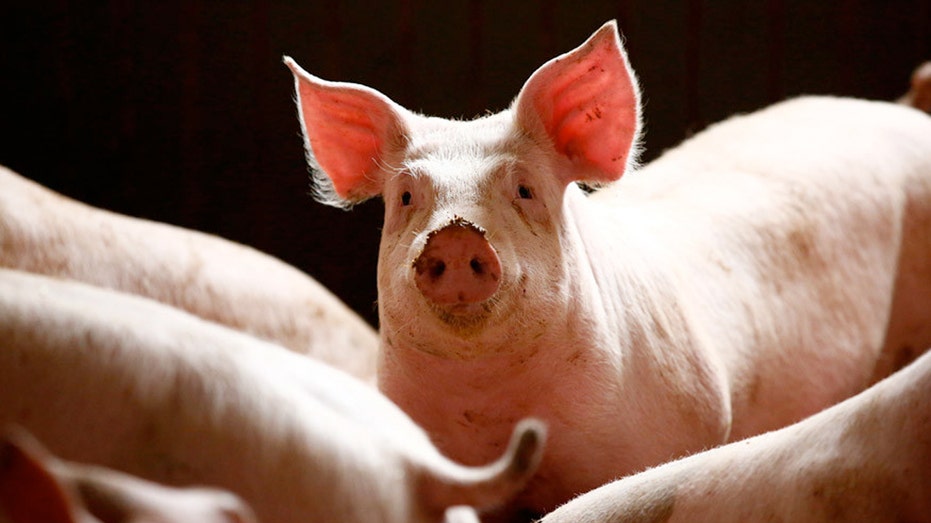Supreme Court delivers blow to pork producers in dispute over California animal welfare law
California's Proposition 12 will cost producers and consumers up to $350 million
Pork producer details consequences of new California pig law
Glenn Stolt, president and CEO at Christensen Farms, argues the new law will cause prices for producers and consumers to soar.
The Supreme Court handed California a legal victory Thursday in a dispute over its animal welfare law, a ruling that could have huge nationwide implications for consumer prices across a broad set of markets.
The Biden administration and the state of California, normally steadfast allies on a range of environmental issues, were at odds in the case over whether California has the right to impose tough animal-welfare standards on pork produced outside the state.
California's Proposition 12 bans the sale of pork products unless the animal from which it derived was housed with specific space allowances.
Two agricultural associations-- supported by Biden's Justice Department -- challenged the 2018 law, saying almost no farms satisfy those housing conditions, and that the "massive costs of complying" will "fall almost exclusively on out-of-state farmers," passing them on to consumers across the U.S.
BIDEN BATTLES CALIFORNIA IN SUPREME COURT FIGHT OVER HOW TO BRING HOME THE BACON
The groups – National Pork Producers Council (NPPC) and the American Farm Bureau Federation – say forcing pork producers to follow California standards would give California the power to unfairly impose new costs on the industry and "transform the pork industry nationwide."

This file photo shows hogs at a farm in Buckhart, Illinois. (AP / AP Images)
"We are very disappointed with the Supreme Court’s opinion," Scott Hays, NPPC president and Missouri pork producer said in a statement.
"Allowing state overreach will increase prices for consumers and drive small farms out of business, leading to more consolidation. We are still evaluating the Court’s full opinion to understand all the implications. NPPC will continue to fight for our nation’s pork farmers and American families against misguided regulations," he said.
The pork farmers say California raises almost no hogs but accounts for 13% of the nationwide pork consumption. It is a $26 billion industry, and pork producers say Prop 12 could cost them up to $350 million to comply with California's requirements.
SUPREME COURT SIDES WITH TRANSGENDER WOMAN OVER DEPORTATION DISPUTE IN UNANIMOUS DECISION
However, the state said it should be allowed to use its market power to enact laws that comport with ethical business practices.
The Supreme Court ruling Thursday was complex, with seven justices signing on to separate opinions over the lengths states can go to regulate livestock conditions in other jurisdictions.
However, the controlling decision from Justice Neil Gorsuch made clear, states have broad discretion to enforce their own consumer laws.

The Supreme Court ruling Thursday was complex, with seven justices signing on to separate opinions over the lengths states can go to regulate livestock conditions in other jurisdictions. (Reuters)
"Companies that choose to sell products in various states must normally comply with the laws of those various states," wrote Gorsuch.
CALIFORNIA REPARATIONS RECOMMENDATIONS HAVE NEWSOM BETWEEN ROCK AND HARD PLACE
"Assuredly, under this Court's dormant Commerce Clause decisions, no State may use its laws to discriminate purposefully against out-of-state economic interests. But the pork producers do not suggest that California's law offends this principle," Gorsuch wrote. "They invite us to fashion two new and more aggressive constitutional restrictions on the ability of States to regulate goods sold within their borders. We decline that invitation. While the Constitution addresses many weighty issues, the type of pork chops California merchants may sell is not on that list."
Chief Justice John Roberts and Justices Sonia Sotomayor and Amy Coney Barrett-- supported by various colleagues-- crafted separate opinions agreeing in part and disagreeing in part with Gorsuch's conclusions.
The Biden Justice Department told the justices the Constitution's "Dormant Commerce Clause" bars states from passing legislation that discriminates against or excessively burdens interstate commerce.

Justice Neil Gorsuch made clear in his opinion that states have broad discretion to enforce their own consumer laws. (Erin Schaff/The New York Times via AP, Pool, File / AP Newsroom)
However, the state – along with animal rights groups – says its residents have spoken with this referendum, that greater awareness of ethical practices is fairly driving market practices, and that humanely-treated livestock benefits the animals – and consumers.
The state says its law is neither protectionist nor discriminatory, which is what the Dormant Commerce Clause was designed to address.
Whole pork sold in California must come from pigs and hogs born to a sow raised in at least a 24-square-foot pen, giving it enough room to lie down and move around. That would include bans on so-called "gestation crates" for breeding mother pigs. The provisions also involve swine raised in group enclosures.
Prop 12—which has yet to go into effect pending resolution of the legal case-- regulates farm animal confinement for egg-laying poultry hens, and veal calves, which are not being specifically addressed by the high court.
"We’re delighted that the Supreme Court has upheld California Proposition 12 – the nation’s strongest farm animal welfare law – and made clear that preventing animal cruelty and protecting public health are core functions of our state governments," Kitty Block, president and CEO of the Humane Society of the United States said in a statement Thursday.
CLICK HERE TO GET THE FOX NEWS APP
"It’s astonishing that pork industry leaders would waste so much time and money on fighting this commonsense step to prevent products of relentless, unbearable animal suffering from being sold in California," she said.




















